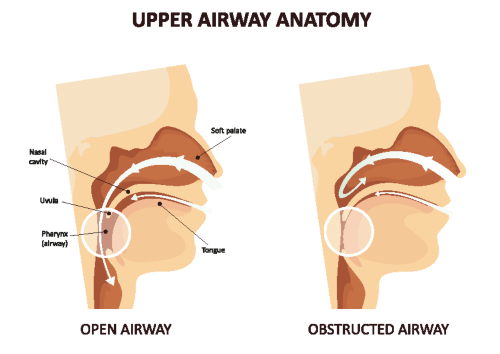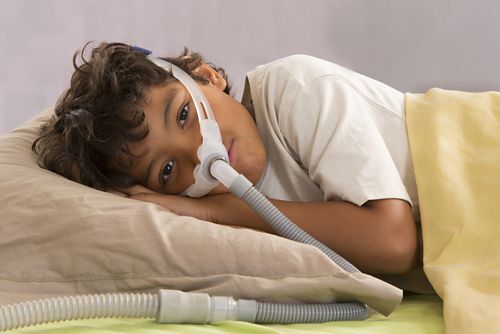What is sleep apnea?
Sleep apnea is a breathing disorder that causes a person to stop breathing for brief periods during sleep. Breathing is irregular with repeated stops and starts. The main types of sleep apnea are obstructive sleep apnea and central sleep apnea.
- Obstructive sleep apnea (OSA) occurs when the throat or upper airway becomes narrow or closed during sleep. This is the most common type of sleep apnea.
- Central sleep apnea occurs when brain signals to muscles that control breathing don’t work properly.
Among pediatric cancer patients, children with brain tumors are at highest risk for sleep apnea. Sleep apnea can make it hard to get enough sleep or have good quality sleep.
Poor quality sleep can cause problems in thinking, emotions, and behavior. Children may have trouble with thinking, attention, or memory and have poor performance at school. In addition, sleep apnea can cause physical problems such as heart problems, high blood pressure, and poor growth.
Causes of sleep apnea
Sleep apnea is caused by narrowing of the upper airway or throat during sleep. Closing of the airway is more common during sleep because the muscles of the throat and tongue relax. In children, having enlarged tonsils or adenoids is a main cause of sleep apnea. Weight gain and obesity can also contribute to sleep apnea.
Children with brain tumors have a higher risk of sleep apnea compared to children with other types of cancer.
A higher risk of sleep apnea is associated with certain medical conditions including Down syndrome, sickle cell disease, cerebral palsy, and neuromuscular diseases.
Diagnosis of sleep apnea
Assessment of sleep apnea may include:
- Medical history and physical exam
- Patient and family interview or questionnaire to explore symptoms
- A sleep study or polysomnography to measure breathing, heart rate, and activity during sleep
Treatment of sleep apnea
Treatment of sleep apnea depends on the cause and severity of the condition and age of the child. Some children may have surgery to remove enlarged tonsils or adenoids. This helps keep the throat more open to allow air to pass through more easily.
Continuous Positive Airway Pressure for sleep apnea
Continuous Positive Airway Pressure or CPAP is a common treatment for obstructive sleep apnea. CPAP delivers a constant stream of room air (not oxygen) through a mask or nosepiece attached to a machine. The air pressure helps the airways stay open during sleep.
Devices are available that automatically adjust air pressure as needed during sleep. These are called self-adjusting CPAPs, Auto CPAPs, or APAPs.
Managing sleep apnea: Tips for patients and families
Lifestyle changes can help reduce sleep apnea and improve sleep:
- Get regular exercise.
- Manage allergies and asthma.
- Don’t smoke.
- Don’t drink alcohol, especially before bed.
- Manage weight.
- Sleep on your side instead of on your back, or use a wedge pillow to elevate the head and upper body.
Resources for more information on sleep apnea


